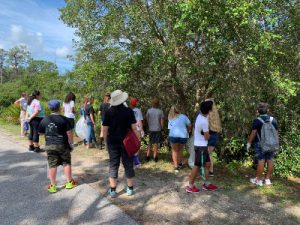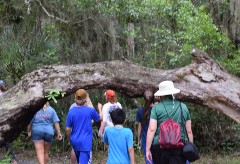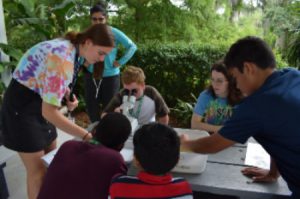
[CREDIT: UF/IFAS Extension Sarasota County, Adelaide Mahler]
What happens at 4-H Camp?
This year, 15 4-Hers spent a week discovering the world around them at Sarasota County’s 4-H Exploring Your Environment Day Camp.
Each morning, students visited a unique habitat in Sarasota to learn about the ecosystem and what impacts it. In the afternoon, students returned to the UF/IFAS Extension Sarasota County office to learn more about the environmental issues influencing these ecosystems. At the end of the week, youth were empowered to protect the natural world and earned their 4-H Environmental Stewardship pin.
You can watch a video of our camp activities here!
Day 1 – Oscar Scherer State Park

[CREDIT: UF/IFAS Extension Sarasota County, Adelaide Mahler]
In the afternoon, we returned to the Extension office where youth imagined their own invasive species and discussed the characteristics that made them difficult to contain. We then learned about land use change and how it impacts native habitats and natural resources by designing our own land development plans.
Day 2 – Siesta Key Beach

After a quick swim, we headed back to the Extension office to observe water samples for microplastics. 4-Hers used microscopes to find microplastics in all of our samples, including drinking water! Following that activity, youth discovered how plastics in our ecosystem affect wildlife through hands-on games. Inspired to cut back on our plastic waste, 4-Hers brainstormed non-plastic alternatives to everyday items.
Day 3 – Florida House Institute

[CREDIT: UF/IFAS Extension Sarasota County, Cailyn Raper]
After trying nearly every edible plant the Florida House could offer, we learned about composting, food waste, food insecurity, and solar energy. 4-Hers got the opportunity to build their own vermicompost (composting with worms) and throw any food waste they had into it. Youth also walked through the steps of the food supply chain and discovered all of the resources that go into each of our meals. To conclude the day, 4-Hers built their own solar ovens to make tasty s’mores.
Day 4 – Myakka River State Park

After that, students analyzed their soil samples and used scientific skills to determine what type of soil we collected. To finish the day, students dissected owl pellets and displayed the bones that they found within them.
Day 5 – Twin Lakes Park
For our final day of camp, 4-H campers spent the day at Twin Lakes Park. Youth spent time dip

4-Hers spent the rest of the day researching and rehearsing for their final presentation. For this presentation, campers formed teams and selected a topic that we discussed at camp to share to the whole group. This was a great opportunity for campers to learn more about their interests and put their new knowledge to the test. After everyone had presented, we celebrated the end of the week with fun music and delicious desserts.
Join 4-H Today!
Although our 4-H Exploring Your Environment day camp only happens over the summer, you or your youth can join 4-H at any time during the year! Children age 5-18 can get involved with their local 4-H chapter to lead community service projects, learn about the environment, care for animals, and more. Learn more at our Join 4-H page.
 0
0
